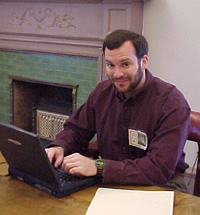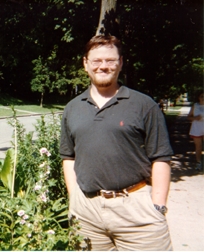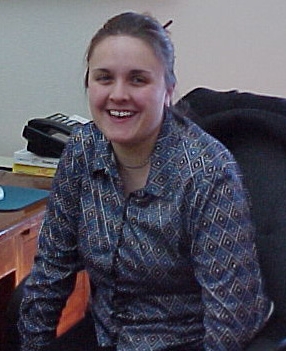Filson Fellowships
By L. Suzette Miguel
Development and Special Events Assistant
 Ph.D. candidate, Robert Owens,
visited The Filson this past March researching his dissertation subject,
“Mr. Jefferson’s Hammer: William Henry Harrison, the Hoosiers, and the
Primacy of Indian Policy in the Early Republic.” He said, “Ever since high
school, I have had an interest in the Ohio Valley and Indian affairs, and
their political, social, and slavery questions.” The son of a high school
history teacher, Mr. Owens said he became especially interested in history
when he began reading historical novels by James Alexander Thom.
At The Filson, he researched the Indiana Territory in the decade before
the War of 1812, specifically background information for his first
chapter which will introduce a cast of reappearing characters. Two such
integral Indiana Territory figures are William Henry Harrison and Little
Turtle of the Miami tribe. He said, “The facility and staff here are first
rate; The Filson is on par with Duke, North Carolina, and Newberry in
Chicago.” Mr. Owens reviewed such Filson collections as the Samuel
McDowell papers, the Arthur Campbell papers, the Anthony Wayne Orderly Books, and the
Thomas Bodley correspondence. He said his experience at The Filson “has
been absolutely and thoroughly pleasant. I wish I had three more weeks and three more
people to help me!”
Ph.D. candidate, Robert Owens,
visited The Filson this past March researching his dissertation subject,
“Mr. Jefferson’s Hammer: William Henry Harrison, the Hoosiers, and the
Primacy of Indian Policy in the Early Republic.” He said, “Ever since high
school, I have had an interest in the Ohio Valley and Indian affairs, and
their political, social, and slavery questions.” The son of a high school
history teacher, Mr. Owens said he became especially interested in history
when he began reading historical novels by James Alexander Thom.
At The Filson, he researched the Indiana Territory in the decade before
the War of 1812, specifically background information for his first
chapter which will introduce a cast of reappearing characters. Two such
integral Indiana Territory figures are William Henry Harrison and Little
Turtle of the Miami tribe. He said, “The facility and staff here are first
rate; The Filson is on par with Duke, North Carolina, and Newberry in
Chicago.” Mr. Owens reviewed such Filson collections as the Samuel
McDowell papers, the Arthur Campbell papers, the Anthony Wayne Orderly Books, and the
Thomas Bodley correspondence. He said his experience at The Filson “has
been absolutely and thoroughly pleasant. I wish I had three more weeks and three more
people to help me!”
When Mr. Owens learned about The Filson Fellowship program, he began researching our collections with the help of The Filson’s online catalog. “I was blown away,” he said. “I try to spread the word that if you are doing an early American topic, you should check out The Filson.”
Because Kentucky is a border state, it is an important place for Mr. Owens to link people and events since “most of the influential people and laws in the Indiana Territory came from Kentucky and Virginia.” Mr. Owens also developed several ideas for future research projects based on discoveries he made at The Filson.
Mr. Owens hails from Iroquois County in Illinois and received his bachelor’s degree from Southern Illinois University. As a graduate student at the University of Illinois at Urbana-Champaign, he works for the Illinois Historical Survey in the University of Illinois library. He plans to defend his dissertation this coming fall.
 Kristopher Ray joined The Filson
from the University of North Carolina at Chapel Hill to conduct research on
his dissertation topic, “From New West to Old South: Panic, Politics and
the Construction of Democratic Institutions Early National Middle
Tennessee, 1790-1834.” He said, “Specifically, I am interested in the
evolution of popular democracy and the ways in which demographic and
economic growth affected the development of democratic institutions.” Mr. Ray applied to be a
Filson Fellow because of The Filson’s “impressive manuscript collections,”
particularly those relating to the southwestern frontier. “Anyone who
assumes The Filson is a ‘Kentucky only’ archive misses out on materials
of critical importance,” he noted.
Kristopher Ray joined The Filson
from the University of North Carolina at Chapel Hill to conduct research on
his dissertation topic, “From New West to Old South: Panic, Politics and
the Construction of Democratic Institutions Early National Middle
Tennessee, 1790-1834.” He said, “Specifically, I am interested in the
evolution of popular democracy and the ways in which demographic and
economic growth affected the development of democratic institutions.” Mr. Ray applied to be a
Filson Fellow because of The Filson’s “impressive manuscript collections,”
particularly those relating to the southwestern frontier. “Anyone who
assumes The Filson is a ‘Kentucky only’ archive misses out on materials
of critical importance,” he noted.
Several of The Filson collections proved useful to Mr. Ray. Among those he found helpful were the Yandell Family papers, the Arthur Campbell papers, and the Bullitt Family-Oxmoor collection. He remarked that in every case, the material reinforced his hypothesis. “Whew!” he said. He added, “And in several cases, [the material] shored up weaknesses in my argument."
Mr. Ray said he has “suffered” from being a history buff as long as he can remember but knows that a biography he read as a child, Abe Lincoln Grows Up, sparked a lifelong fascination with political history. During his graduate studies, he has become more and more interested in the impact of the institution of slavery on the Old South’s political and economic structures and in the question of southern identity in the Confederate states. “The Tennessee frontier became a natural topic for research because it provides clues to both of those issues,” he said.
Originally from San Antonio, Texas, Mr. Ray lives with his wife, Brandi, a public-interest lawyer, in North Carolina. He hopes to finish his dissertation, “Progress and Popular Democracy on the Southwestern Frontier: Middle Tennessee, 1790-1824,” next summer.
 Jennifer Cole puts her bachelor’s degree in history to work every day as one of the
University of Louisville Mike Harreld Interns. Currently a graduate student at U of L
pursuing her master’s degree, Cole said, “Working in public history at an institution such as
The Filson helps me to see what different outlets there are for people with their master’s
in history.” Her experience at The Filson, and previously at Farmington Historic Home,
has emphasized that she is not limited only to teaching for her career. Work in public history
combines history and working with the public to include such activities as archiving and
museum work as opposed to independent research.
Jennifer Cole puts her bachelor’s degree in history to work every day as one of the
University of Louisville Mike Harreld Interns. Currently a graduate student at U of L
pursuing her master’s degree, Cole said, “Working in public history at an institution such as
The Filson helps me to see what different outlets there are for people with their master’s
in history.” Her experience at The Filson, and previously at Farmington Historic Home,
has emphasized that she is not limited only to teaching for her career. Work in public history
combines history and working with the public to include such activities as archiving and
museum work as opposed to independent research.
This Covington, Kentucky, native has contributed to many diverse projects in the special collections department under the guidance of curator Jim Holmberg and research assistants Mike Veach and Becky Rice. “During my internship, I have cataloged numerous collections, such as individual letters, groups of letters, family papers, diaries, and scrapbooks. I learned how to pre-process the collections, read them for content, produce cards for the catalog, and put them online.” She said that her work at The Filson has brought her closer to American, and specifically Kentucky, history. Cole hopes to continue working at The Filson or another historical institution after she earns her degree.
Cole’s scholarship package included this internship at The Filson which she noted is the premier public
history internship that U of L offers to its history students.
About |
The Filson Historical Society
1310 South Third Street - Louisville, KY
40208
Phone: (502) 635-5083 Fax: (502) 635-5086
Hours
The Ferguson Mansion and Office
Monday - Friday: 9 am. - 5 pm.
Saturday and Sunday closed
Library
Monday - Friday: 9 am. - 5 pm.
Saturday: 9 am. - 12 noon
